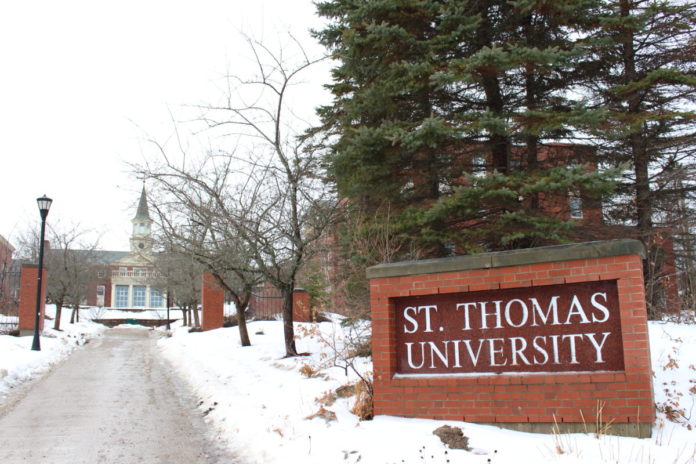St. Thomas University hosted its annual budget town hall over Microsoft Teams on March 25.
Lily Fraser, STU’s vice-president finance and administration, presented a scenario where the university were to increase tuition fees by three to five per cent. She said for New Brunswick students who enrolled in the 2018-19 year or earlier would have their increase capped at two per cent. A N.B. student must meet the definition of a N.B. resident by the New Brunswick Student Financial Assistance Program, according to the STU website.
“The outlook for 2021-22 is concerning, in the sense that in the current year enrollment decreased,” said Fraser. “All factors taken into consideration, we’re looking at an estimated operating deficit of about [$500,000] to $700,000.”
Jeffrey Carleton, associate vice-president of communications at STU, said no tuition increase for students will be confirmed until early May.
Fraser said the rates for double and single rooms will increase by one per cent and six per cent respectively. She said the university wants to keep double room prices accessible, but the single room increase is born out of the need to repay the deficit.
“We simply don’t have a reserve anywhere to cover that deficit,” said Fraser.
Dawn Russell, STU’s president, said that the 2019-20 year resulted in a deficit of $290,000, which was covered by a transfer of $300,000 from internally restricted funds. Carleton said the internally restricted funds refer to funds from the Gerontology Endowment that they have the flexibility to use consistent with the terms of the endowment.
For last year’s ancillary budget, there was a deficit of $94,000 before principal payment on long-term debt.
“Despite the deficits, these are actually much improved compared to five years ago, when the operating and ancillary deficits were $1.3 million, and $563,000 respectively,” said Russell.
For the current year, Russell said they are forecasting an operational deficit of $306,000 before interfund transfers, which is $85,000 less than the budgeted deficit.
Fraser said that the university requested $400,000 in restricted capital funds from the province, to be used in operations, which the province approved.
Ancillary deficit this year is forecasted at $1.5 million, compared to a budgeted $1.7 million.
Russell said that this deficit is caused by the lower occupancy in residences as a result of the COVID-19 pandemic. She said that based on her meetings with other university presidents, the issue is universal.
Russell said that a separate ancillary budget is developed for expenses related to residences and dining halls “because ancillary operations must be self-supporting,” which means they are not eligible for government assistance.
“We are, however, seeing positive signs indicating the possibility of a more traditional return to campus in September,” said Russell.
Russell said the university is affected by the low number of high school graduates from New Brunswick, stating that the university relies on these graduates. The presented statistics show that roughly 73 per cent of graduating STU students are from New Brunswick.
Fraser said that between 2010 and 2019, full-time enrollment at STU declined by 20 per cent.
Russell also said STU has received a “comparatively small endowment” and that the university is being affected by the volatility of capital markets that affect investment income for the university.
Russell said that over the last few years, the university has improved its financial sustainability by reducing the operating budget deficit from $1.3 million to $300,000, despite adding a million in scholarship and bursary costs to the budget.
Russell said the progress has come from moving the funding for scholarships from internally restricted funds to other sources, such as operations and campaign donations.
“Over the last five years, we have raised [approximately] $15.2 million through our capital campaign, $7.5 million of that is devoted to student aid, $3.9 million for scholarships endowments and $3.6 million for student bursaries,” said Russell.
Fraser said the university plans to gradually replace the types of scholarships that used to be funded through internally restricted funds, such as the President’s Scholarship, with external funding.
Russell said she plans to continue efforts to address the provincial operating grant inequity and said she has a meeting with Premier Blaine Higgs on the issue scheduled for mid-April.
She urged those interested to read the budget development report in order to gain an understanding of the context of their strategies.
“The current global pandemic has exacerbated our financial challenges,” said Russell.

